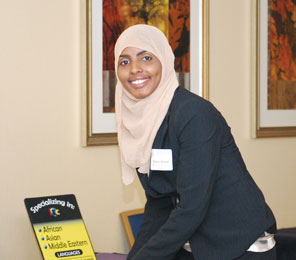 Speaking many languages and representing many cultures, more than 200 medical interpreters convened on Friday, June 22, with one common goal: to refresh their knowledge and sharpen their skills in preparation for professional certification. They were attending Paving the Way to Health Care Access, a day-long continuing education conference designed to prepare them to sit for one or both of the two nationally accepted medical interpreter certification exams. The conference was hosted by MassHealth and the Massachusetts Area Health Education Centers (MassAHEC) Network in collaboration with the Massachusetts Forum on the Coordination of Interpreter Services (FOCIS).
Speaking many languages and representing many cultures, more than 200 medical interpreters convened on Friday, June 22, with one common goal: to refresh their knowledge and sharpen their skills in preparation for professional certification. They were attending Paving the Way to Health Care Access, a day-long continuing education conference designed to prepare them to sit for one or both of the two nationally accepted medical interpreter certification exams. The conference was hosted by MassHealth and the Massachusetts Area Health Education Centers (MassAHEC) Network in collaboration with the Massachusetts Forum on the Coordination of Interpreter Services (FOCIS).
As the number of people in the United States who are considered limited-English speakers—because their native language is not English—increases, trained medical interpreters have become vital members of the health care team, helping to overcome language barriers and bridge cultural differences between health care providers and patients. “With our medical interpreter training program, MassAHEC has been able to be a part of the movement to standardize training across the nation,” said Lisa Morris, MSTD, director of cross-cultural initiatives for MassAHEC. “Ours is one of the few programs providing and guaranteeing recognized credentials and expertise.”
The MassAHEC Network, a federally funded workforce development program hosted by UMass Medical School, has been training 200 to 300 participants each year since launching its Medical Interpreter Training (MIT) program in 1999 and has become the primary trainer of medical interpreters in the state. The 60-hour Fundamentals of Medical Interpreting curriculum developed by MassAHEC prepares multilingual students, many already working in or interested in health care, to meet evolving standards of practice that distinguish those with training from ad hoc interpreters such as family members or other bilingual employees. Trainees are bilingual or multilingual in English and, collectively, more than 30 other languages.
“Communication is essential to good health care, so our focus has always been on professionalizing medical interpreters to make them full members of the health care team,” explained Morris, a longtime pioneer in medical interpreter training.
| Medical interpreting: a fast-growing career According to the latest edition of the United States Department of Labor’s Occupational Outlook Handbook, employment of interpreters and translators is expected to grow 42 percent by 2020, much faster than the average for all other occupations. Employment growth will be driven by broadening international ties and by large increases in the number of non-English-speaking people in the United States. Job opportunities should be best for those who have professional certification. |
|
Attendees at the conference, billed as “A Day of Learning for Interpreters: Improving Interpreter Skills and Language Access,” were able to rotate through workshops in each area of competency covered in the MIT curriculum and required for certification:
-
Medical terminology—how terms are constructed, their use in medical specialties and the importance of having proper knowledge and domain of medical terminology.
-
Ethics and standards of practice—an overview of the written questions in both certification exams.
-
Body systems—review of the anatomy (structure) of the body, the physiology (function) of each body system, and other topics related to symptoms, diseases and treatment.
-
Sight translation—the basic concepts and techniques of translating documents commonly encountered in health care settings.
-
Simultaneous interpretation—an overview of the cognitive and pragmatic differences between consecutive and simultaneous interpreting, and the skills needed to transition between them.
In addition, a workshop on computer skills provided tips and strategies for taking the written and oral certification exams via computer.
“Thank you so much for working with us to provide such a marvelous day of training and spirited sharing at Paving the Way,” FOCIS board member Jessica Goldhirsch, MPH, wrote to Morris after the conference. “The interpreters greatly appreciated the attention paid to the advancement and cultivation of their skills.”
“What we do fits hand-in-glove with advancing patient-centered medical care,” Morris concluded. “Improving language access for all patients engenders respect and discourages stereotyping in our increasingly multi-cultural society.”